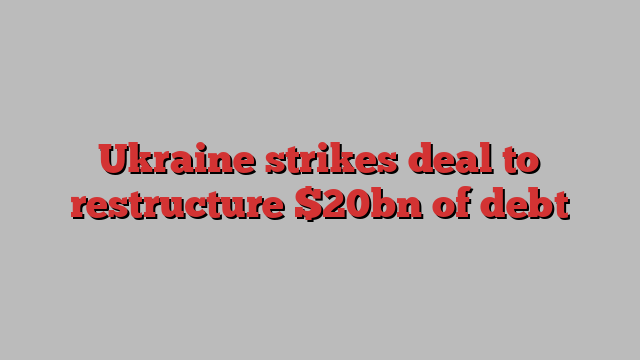
Stay informed with free updates
Simply sign up to the War in Ukraine myFT Digest — delivered directly to your inbox.
Ukraine has struck a deal with international bondholders to restructure about $20bn of debt, boosting Kyiv’s drive to use private capital to finance its war effort against Russia.
President Volodymyr Zelenskyy’s government said on Monday that it won support from investors to reduce the face value of the debt by more than a third, paving the way for a formal restructuring in the coming weeks.
The agreement will replace a two-year moratorium on bond payments that was granted after Russia’s full-scale invasion of Ukraine in 2022 but was due to expire next month.
Ukraine sought debt relief as part of its conditions for continuing bailout loans from the IMF, which said it had endorsed Monday’s deal alongside backing from the US, UK and other allies that are financing Kyiv’s war effort.
Ukraine finalised terms last week during talks with a committee of bondholders, as well as other investors, which together own about a quarter of the debt.
“As long-term investors in Ukraine, we are pleased to be able to provide significant debt relief to Ukraine, assist its efforts to regain its access to international capital markets, and support the future reconstruction of the country to the benefit of the Ukrainian people,” the committee said.
The terms of the deal reflect deep uncertainty over the impact of a longer conflict on Ukraine’s economy and its ability to bear significant amounts of debt.
In return for writing off 37 cents per dollar of the old debt, bondholders will firstly receive bonds worth 40 cents of their original claim. These will restore interest payments immediately, rising from 1.75 per cent over the next year to 4.5 per cent from 2026, with later increases.
They will also receive a bond worth 23 cents, which will not pay interest for the next three years, but could increase to 35 cents if Ukraine’s nominal gross domestic product exceeds IMF targets by at least 3 per cent, and up to 7.5 per cent, in 2028.
Overall, the restructuring will slash Ukraine’s previously scheduled bond payments by more than $11bn, or 90 per cent, in the next three years.
By restarting payments to private investors after the moratorium, Ukraine hopes it can entice them to finance reconstruction, people familiar with the talks said.
Ukraine’s full return to bond markets is seen as unlikely as long as the war continues, but it could attract other sources of private capital such as loans guaranteed by development banks. Such funding could mitigate a feared reduction in support if Republican nominee Donald Trump wins the US presidential election, investors and analysts have said.
Ukraine and the bondholder committee broke off initial discussions last month with positions far apart on the level of debt reduction that was needed, before formal talks restarted in the past two weeks.
Monday’s deal also has terms on how to approach a potential further restructuring in 2027, when Ukraine’s official creditors are expected to provide their own debt relief.
Some investors had backed a further suspension of payments because of uncertainty over the war’s course and western support, arguing that a debt restructuring was best left until the conflict ended.
However, a new suspension was not officially tabled in the talks, and Ukraine was reluctant to add to a pile of unpaid interest that has already reached about $3bn since 2022, people familiar with the matter said.
“Bondholders think, why should I be the first to take the hit,” a veteran investor in Ukraine, who does not hold the government’s bonds, said. “But Ukraine’s government thinks that now is the time to take the pain.”